Sociology Class 12 Chapter 4 Processes of Social Change in India Question Answers Maharashtra Board
Balbharti Maharashtra State Board Class 12 Sociology Solutions Chapter 4 Processes of Social Change in India Textbook Exercise Questions and Answers.
Processes of Social Change in India Class 12 Sociology Chapter 4 Questions and Answers
1A. Complete the following statements by choosing the correct alternative given in the brackets and rewrite it.
Question 1.
The use of computers to streamline job applications is called __________ (industrialization, globalisation, digitalization)
Answer:
digitalization
![]()
Question 2.
An urban way of life is characterized by __________ (cohesiveness, uniformity, impersonality)
Answer:
impersonality
1B. Correct the incorrect pair and rewrite it.
Question 1.
(a) Copying western culture – Modernisation
(b) Growth of cities – Urbanisation
(c) Increase in production – Industrialisation
(d) Radical transformative use of technology – Digitalisation
Answer:
(a) Copying western culture – Westernisation
1C. Identify the appropriate term from the given options in the box and rewrite it against the given statement.
Urbanism, Industrialisation, Digitalisation
Question 1.
The FYJC On-line Admission process in metropolitan cities.
Answer:
Digitalisation
Question 2.
Mechanisation of the process of production.
Answer:
Industrialisation
1D. Correct the underlined words and complete the statement.
Question 1.
The Industrial Revolution took place in the sixteenth century.
Answer:
The Industrial Revolution took place in the 17th and 18th centuries.
![]()
Question 2.
The LPG Policy was started by Smt. Indira Gandhi.
Answer:
The LPG Policy was started by Dr. Manmohan Singh.
2. Write short notes.
Question 1.
Negative effects of digitalisation
Answer:
- Digitalisation is the use of digital technologies for handling data of various nature for various purposes. It has a negative impact on small-scale industries because large industries have greatly adapted to the changing scenario but small ones are finding it difficult to accept and get used to digitalisation.
- Impact on marketing and consumer behaviour. Questions relating to individual privacy in the web world arises.
- Excess and uncontrolled use of digital media results in addiction, cyberbullying, anxiety, depression, etc.
- It affects not only social and physical but also mental health is hampered due to excessive and uncontrolled use of digitalisation.
Question 2.
Consequences of Industrialisation
Answer:
- Industrialisation means the process of starting and encouraging heavy industries in society.
- Due to industrialisation, a modern class system has emerged in India.
- A spurt in the growth of factories and industries.
- The development of industries led to the mechanisation of workplaces.
- The emergence of division of labour and specialisation
- The emergence of automation and mechanisation led to capital intensive.
- The process of industrial growth led to the large-scale emergence of factories.
- This in turn resulted in migration to places nearer the factory sites, leading to the growth of metropolitan cities, which have resulted in the breakdown of joint families.
3. Write differences.
Question 1.
Industrialisation and Urbanisation
Answer:
| Industrialisation | Urbanisation |
| (i) Meaning: It means the use of unbiotic power such as electricity and steam for the mass production of goods. | (i) Meaning: Urbanisation consists of an inward flow of a large number of people from scattered rural areas to urban communities. |
| (ii) Origin: Industrialization started in England due to the impact of the industrial revolution. | (ii) Origin: Urbanization is the consequence of industrialization. |
| (iii) Nature: Industrialisation reflects mechanisation of workplaces and spurt in the growth of factories and industries. | (iii) Nature: Urbanisation reflects the migration of people from all over the country continuously, in search of work. |
| (iv) Characteristics: The adoption of the revolutionary changes occurred in the production system i.e. use of heavy machinery and automation. | (iv) Characteristics: The adoption of the civil administration like law and city police for the urban area. |
| (v) Impact: Due to industrialisation impact of scientific and technical knowledge has been increasing. So, people are accepting rationalism and secularism. | (v) Impact: Due to urbanisation, the traditional belief system has been changed and become more secular in their outlooks, new educational fields are created in cities. |
| (vi) Effect: Industrialisation has led to the breakdown of joint families and the shrinking size of families. | (vi) Effect: Urbanisation has led to the notion of being “lonely in a crowd”. |
Question 2.
Modernisation and Globalisation
Answer:
| Modernisation | Globalisation |
| (i) Meaning: “Modernisation is the current term of an old process of social change whereby less developed societies acquire the characteristics common to more developed societies.” | (i) Meaning: Globalisation refers to “all those processes by which the people of the world are incorporated into a single world society.” |
| (ii) Characteristics: Modernisation reflects a rational outlook and scientific temperament and discarding traditional ways as these hinder the progress of the society. | (ii) Characteristics: Globalisation reflects the new economic policy means LPG policy which opens the door for the Indian economy and India became part of a wider global economy. |
| (iii) Manifestations: The adoption of the progressive ideas of the developed countries such as industrialisation and computerisation are its manifestations. | (iii) Manifestations: It leads to the transfer of resources, goods, and capital across the country. |
| (iv) Impact: Modernisation in every walk of life has contributed to the material progress of society and the well-being of individuals. | (iv) Impact: Globalisation has promoted industrialisation, expanded market, increase export as well as export area. Globalisation has created various new opportunities of employment. |
4. Explain the following concepts with examples.
Question 1.
Digitalisation
Answer:
- Digitalisation is the use of digital technologies for handling data of various nature for various purposes.
- It involves the process of digital transformation, which improves the performance of the business.
- It leads to frequent changes in business models due to growth in newer technologies.
- Digitalisation is based on technology, innovation, research, and development.
- Digitisation has escalated the speed of the processes with a far greater extent of accuracy.
- Digitisation is based on technology, innovation, research, and development that has encouraged human minds to invent, innovate, patent, and create.
- Example: Artificial intelligence, e-governance, e-commerce, e-learning, e-trade, e-shopping, integration of technology for the purpose of education in the 21st century, etc.
![]()
Question 2.
Urbanisation
Answer:
- Urbanisation is a process of migration of rural population to urban areas.
- In this process, people also adopt the urban lifestyle, which means “urbanism as a way of life”.
- It results in the decline of the joint family and the emergence of the nuclear family secondary type relations, calculative, independent, rational, less impact of traditions, family, religion, customs etc.
- Urbanisation led to a heterogeneous gathering of people has led to the breakdown of several traditional barriers, where one’s contribution becomes more valued.
- Overpopulated, mega metro cities.
- Example: Mumbai, Pune, Nagpur.
5A. Complete the concept map.
Question 1.
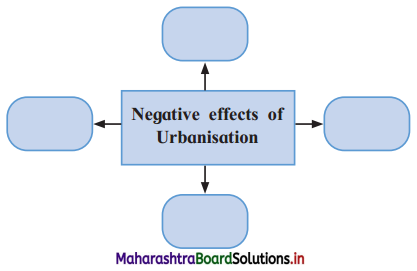
Answer:

5B. State whether the following statements are True or False with reasons.
Question 1.
The clothes one wears are indicative of an individual’s level of modernization.
Answer:
This statement is False.
- Being modern doesn’t mean one should be loaded with devices, gadgets, and clothes.
- Modernisation means rationalism, scientific outlook and willingness to receive new ideas, examine alternatives, find new pathways, to explore creative ways to solve problems.
- Persons who claim to be modern are willing to examine daily events, literature, culture, art, customs, beliefs from a critical point of view and be able to explain the constructive and destructive aspects of a phenomenon.
- Being ‘modern’ cannot be limited to only using modern devices or gadgets or fashionable clothes.
![]()
Question 2.
Urbanisation can have negative effects on our social relationships.
Answer:
This statement is True.
- Urbanisation means the migration of rural people to urban areas, that results in family discords and breaking up of joint families.
- Due to urbanisation materialistic approach is increased and reduces the emotional ties and develops secondary relationships among people.
- They develop a certain way of life which is typical of the urban mindset: distant, secondary-type relations, calculative, independent, rational, less impact of traditions, family, religion, customs etc.
- The urban environment and way of life are more materialist, radical, commercial, individualist, and non-conforming. Urbanisation has led to the notion of being “lonely in a crowd”.
6. Give your personal response.
Question 1.
Shagufta Ranawat and her joint family have been living in Nagpur city for almost three generations. Their grandchildren are uninclined to want to settle down in their grandparent’s village. Give two possible reasons for the grandchildren’s view.
Answer:
1st View: As Shagufta Ranawat and her family from last three generations living in Nagpur city. Nagpur is one of the mega metro cities of India which is loaded with full of infrastructural facilities as well as employment opportunities, gender equality even through materialistic approach it has a rational and scientific outlook. So, grandchildren don’t want to leave Nagpur city and settle down in the village.
2nd View: Grandchildren know that now grandparents are age-old and advanced medical facilities will not be easily available during emergencies. So for precautionary measure of grandparent’s health, living in Nagpur city which is a well-developed hub is good for them.
Question 2.
Some people feel insecure about digitalisation processes, for example, in banking or online purchasing. Why do you think this is the case?
Answer:
Yes, some people feel insecure about digitalisation processes because of being computer phobic or computer illiterate, as they don’t trust the internet and perceived security risks. The perception that someone else has access to your bank account is a deal-breaker for many. It’s a big jump into the unknown with your hard-earned money especially if you have no one to explain it to you.
7. Answer the following question in detail. (About 150-200 words)
Question 1.
“The World Wide Web is a source of information and misinformation”. Discuss this statement with regard to the impact of the internet on:
(i) Parents
(ii) Children
(iii) School
Answer:
(i) Impact of the Internet on Parents:
- Parents know that the internet is a window opening to the whole world and as a tool to get information.
- Parents are aware of the positive and negative effects of internet use.
- Parents know that the internet is useful for attaining information.
- They mainly consider it as an effective means of communication due to instant messaging services that can communicate to any part of the world.
- It improves business, interactions, transactions saving vital time.
- Banking, shopping online has made life less complicated for parents.
![]()
(ii) Impact of the Internet on Children:
- Maximum children are busy playing games online.
- Increased use of the internet among children is making them feel lonely and depressed.
- More time spent online means children spent less time with family and friends or working on hobbies.
- Internet allows children to participate actively in a self-learning environment.
(iii) Impact of the Internet on School:
- The internet has not only increased the amount of learning possibilities in the classroom but it has created infinite amounts of learning opportunities for students and teachers.
- Use of internet in the school improves the quality of education in many ways.
- Teachers can use online materials to prepare lessons.
- The Internet plays a very vital role in education.
Activity 1 (Textbook Page No. 59)
Identify any four cities and study data about their industrial growth. Presents your findings to your class and follows them with a discussion.
Answer:
(i) Industrial growth in Mumbai:
- Mumbai is the economic capital of India.
- In earlier days cotton textile industry dominated Mumbai’s economy, but now Mumbai’s economic base is diversified.
- Textiles industries still remain important, but the city’s industries include petrochemicals, automobile manufacturing, metals, electronics, engineering, food processing, and a wide range of light manufacturing.
(ii) Industrial growth in Pune:
- From a small university town to IT hub, Pune has changed its face over the years.
- Numerous automobile manufacturers and ancillary companies have today invested heavily in Pune.
e.g. TATA motors, Cummins, etc.
(iii) Industrial growth in Nagpur:
- One of the largest industrial estates approximately 6000 Hectares of Asia is located at Butibori near Nagpur.
- About 47% of Maharashtra State’s power is generated around Nagpur.
(iv) Industrial growth in Kolkata:
- Industrial growth rate of West Bengal is 1.1% higher than the national average.
- The growth and development are around the capital city of Kolkata.
- Kolkata is home to many industrial units, major sectors are steel, mining, minerals, cement, etc.
Activity 2 (Textbook Page No. 60)
Get 4 volunteers from your class to share their experiences (physical environment, economic life, customs, food, religious practices etc.) in a rural village or city, in 5-7 minutes each. They may make a PPT with visuals to support their presentations. Follow up with a class discussion.
Answer:
| Volunteer – 1 Village – Khed, Junnar Taluka |
Volunteer – 2 Village – Ghodegaon, Manchar Taluka |
Volunteer – 3 City – Pune |
Volunteer – 4 City – Mumbai |
|
| Physical Environment | Clean, pure, and healthy air | Clean, pure and healthy air | Pollution and overcrowded | Pollution and shortage of land |
| Economic Life | Agrarian (Poor) | Agrarian and domestic business | Industry and factory oriented (Rich) | Industrialisation (Rich) |
| Customs | Traditional and superstition bound | Tradition and superstition bound | The rational and scientific perspective | Follow the customs rationally |
| Food | Jawar, wheat, rice (Homemade) | Staple food | Materialistic approach | Materialistic view |
| Religious practices | Follow judiciously and blindly | Follow blindly | Modern/critical thinking | Modern/critical thinking |
Activity 3 (Textbook Page No. 62)
Conduct a 2-minute extempore speech competition in class on the topic: “Modernisation may be perceived as a challenge in a traditional society.”
Answer:
The following pointers will help you prepare a speech.
- It is a process of social transformation.
- The developing countries imitate the western model of development. Thereby the traditional society becomes a technologically modern society.
- It develops new attitudes, new values and social relationships.
- It has paved a way for developing a scientific temperament.
- It encompasses social, economic, political, religious, and intellectual changes.
- Modernisation is a current term of an old process of social change.
![]()
Activity 4 (Textbook Page No. 63)
Given below is a way of finding out about people’s lives. It is called narrative research. It is all about hearing people’s stories.
Few volunteers from your class may speak to 1-2 small shops in the area and find out about their business. When did it start? Who started it? Are there changes in their sales? Are there changes in people’s behaviour? Are there any problems faced by the sellers? If so, what are they?
Write about their stories in about 200-300 words. Share with your class. See if you can see a pattern of experience or behaviour.
Answer:
The below example will provide you with pointers for your own narrative research.
- Shop Name – Pooja (General Stores)
- Owner Name – Mr. XYZ
- Area – Badlapur (West), Thane
- When did it start – 1990
- Who started it – Mr. XYZ’s Father
- Are there changes in their sales? – Yes, up and downs in profit margins.
- Are there changes in people’s behavior – Yes, due to last 3 decades won the trust of the people
- Are there any problems faced by the sellers – Yes
- What are they – Loss of profit margins recession, natural calamity like a flood.
Activity 5 (Textbook Page No. 65)
Identify any three Higher Secondary School teachers in your locality or school. Collect information about (a) the subject they teach, (b) their qualifications (e) number of years of teaching experience, (d) whether they have computers in their school/college, (e) whether they use computers and if yes, for what purpose? Report your findings in class.
Answer:
| Questions | Teacher – 1 (Ms. L) | Teacher – 2 (Ms. M) | Teacher – 3 (Mr. X) |
| The subject they teach | English | History | Marathi |
| Qualification | M.A, B.Ed., M.Phil. (Eng.) | M.A., B.Ed. (History) | M.A., B.Ed. (Mar.) |
| Teaching experience | 5 Years | 10 Years | 9 Years |
| Whether they have computers in school/college | Yes | Yes | Yes |
| Whether they use computers and if yes, for what? | Yes, for preparation of notes, questions papers, research work, and references. | Yes, for making notes. | Yes, for making notes. |
Activity 6 (Textbook Page No. 65)
‘Globalisation has a positive effect on Indian society.’ Form two teams of four students each, and conduct a class debate. The teacher may prepare a blackboard summary of the learning points. It can be followed by an open discussion of observations made by students.
Answer:
(i) Globalisation has a positive effect on Indian Society: (Debate 1st side)
- It’s a universal process.
- Transformation of the national economy into global economy.
- The growing economic interdependence of the countries of the world.
- Integration of the world economy, free trade.
(ii) Globalisation has a negative effect on Indian Society: (Debate 2nd side)
- The role of the state, the public sector has been curtailed by privatisation.
- An increasing number of young immigrations of the young technocrats to the developed countries, leaving behind the aging parents.
- There is an increase in the family discords and break up of more and more families and marriages.
- The small-scale industries face stiff competition from the large-scale industries and their multinational counterparts.
![]()
Activity 7 (Textbook Page No. 67)
Hold a class discussion at the end of each process of change, to discuss the positive and negative impact of each process. Develop a flow chart or concept map for each process of social change.
Answer:






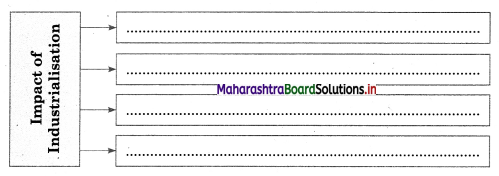
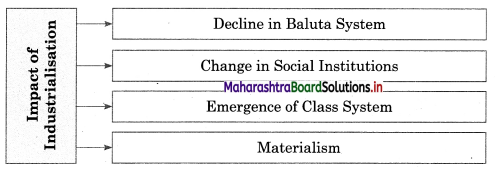



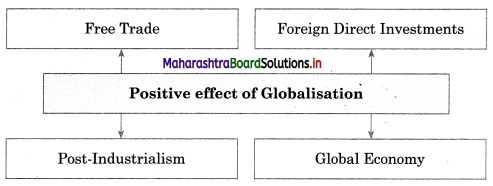
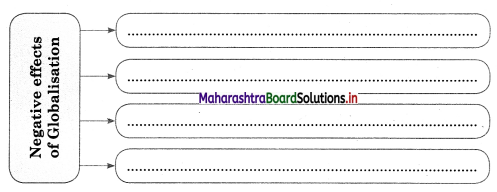
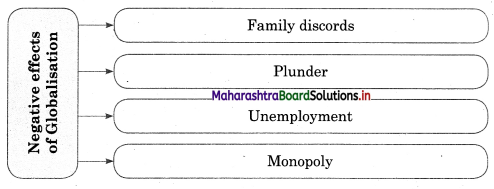
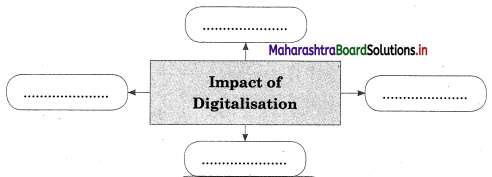
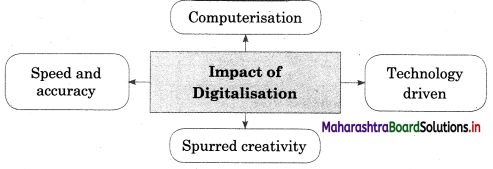




Class 12 Sociology Textbook Solutions Digest
- Sociology Class 12 Chapter 1 Question Answers
- Sociology Class 12 Chapter 2 Question Answers
- Sociology Class 12 Chapter 3 Question Answers
- Sociology Class 12 Chapter 4 Question Answers
- Sociology Class 12 Chapter 5 Question Answers
- Sociology Class 12 Chapter 6 Question Answers
- Sociology Class 12 Passages Answers